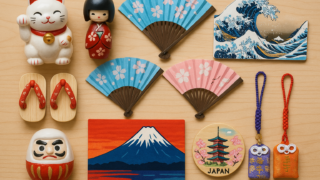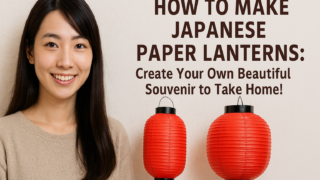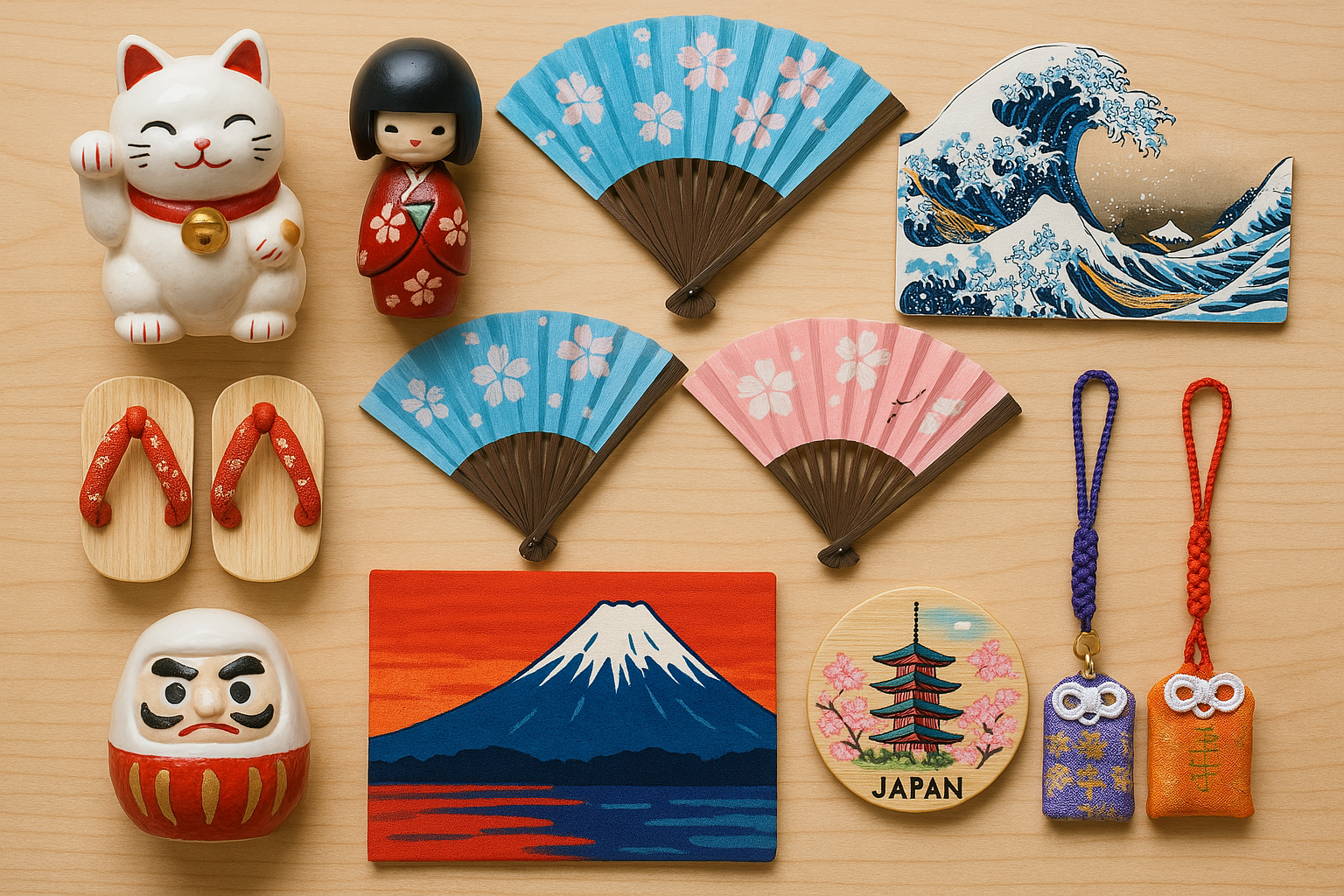Top 20 Japanese Cultural Souvenirs You Shouldn’t Miss in Asakusa: Must-Have Treasures for Your Japan Adventure
- Introduction: Why Asakusa is a Must-Visit for Souvenir Shopping
- 1. Traditional Japanese Fans (Uchiwa and Sensu)
- 2. Kimonos and Yukatas: The Classic Japanese Attire
- 3. Japanese Lanterns (Chochin)
- 4. Japanese Tea Sets
- 5. Wooden Chopsticks
- 6. Japanese Calligraphy Supplies
- 7. Omamori (Japanese Good Luck Charms)
- Conclusion: Bringing Home a Piece of Japan from Asakusa
Introduction: Why Asakusa is a Must-Visit for Souvenir Shopping
When you think of Tokyo, Asakusa is probably one of the first places that pops into your mind. Known for its rich history, stunning temples, and vibrant shopping streets, Asakusa is a goldmine for cultural souvenirs that will leave you with memories to treasure for years. Whether you’re a first-time visitor or a seasoned traveler, this district has something special for everyone. Imagine walking through Nakamise Street, with its rows of traditional shops offering everything from samurai replicas to tasty treats. Now, let’s dive into the top 20 cultural souvenirs you should absolutely pick up in Asakusa.
1. Traditional Japanese Fans (Uchiwa and Sensu)
When you think of Japan, fans are likely to come to mind – they’re so iconic! The Uchiwa (flat fan) and Sensu (folding fan) are not just tools to cool down in the summer, but also beautiful works of art that are often decorated with intricate designs. They’re lightweight, portable, and perfect for adding a touch of traditional Japan to your home. I once took one to a summer festival in Kyoto, and I’ll never forget the smiles it sparked when I opened it. In Asakusa, you’ll find a variety of these fans, often made from bamboo and silk, each one with its own story to tell.
Why They’re Special
Fans like these are a classic piece of Japanese culture, often used in traditional performances like Kabuki or tea ceremonies. In fact, they have been a part of Japanese life for centuries, used not only for cooling but also as symbolic items. You’ll see different fan designs depending on the season, as flowers, animals, and nature motifs are common themes.
Where to Buy in Asakusa
Make sure to stop by Nakamise Street where you’ll find shops offering fans in all sizes and designs. These fans make perfect gifts for family or friends back home – they’re compact, practical, and offer a slice of Japanese culture. Trust me, they’ll thank you for this unique souvenir!
2. Kimonos and Yukatas: The Classic Japanese Attire
If you’ve ever dreamed of walking the streets of Japan in traditional attire, Asakusa is the place to do it. Kimonos and Yukatas, though often confused, are two staples of Japanese fashion that you absolutely should consider when visiting. While the Kimono is a formal garment with beautiful embroidery, the Yukata is a lighter, casual version that’s perfect for summer festivals. On my first trip to Asakusa, I rented a Yukata and was surprised by how many people stopped to take photos of me – it’s like stepping into another world!
What’s the Difference Between a Kimono and Yukata?
The Kimono is often worn on formal occasions and is made from heavier, high-quality materials like silk. The Yukata, on the other hand, is made from cotton or other lighter fabrics, designed to keep you cool during the warmer months. They both represent the rich cultural heritage of Japan, but the Yukata is definitely more casual and practical for sightseeing. I’ve worn a Yukata during a summer matsuri (festival), and it felt so immersive – it’s the perfect way to get in touch with traditional Japan.
Where to Find Them
You’ll find plenty of shops and rental stores in Asakusa offering these beautiful garments. Many stores also provide rental services, so if you want to try one on and experience what it’s like to wear a Kimono or Yukata, this is the place to do it! It’s the perfect way to immerse yourself in the Japanese experience while visiting Asakusa.
3. Japanese Lanterns (Chochin)
Have you ever seen one of those glowing red lanterns hanging outside a traditional Japanese temple or restaurant? That’s a Chochin! These colorful lanterns are symbols of good fortune and prosperity. They’re often used to mark special occasions or festivals, and they add a magical ambiance to any environment. I remember the first time I saw a row of them lighting up a quiet street in Asakusa; it felt like I was in an old-world Japanese film.
The Symbolism Behind Chochin
Chochin are often hung to attract positive energy and drive away evil spirits. In the past, they were used in homes to welcome guests or in shops to advertise. The red color is particularly symbolic, representing joy, happiness, and success. If you’re looking to bring some traditional Japanese charm into your home, a Chochin is a fantastic option.
Best Spots to Buy in Asakusa
Asakusa is full of specialty shops that sell these iconic lanterns in all sizes and colors. You can find small ones to hang in your home or larger versions that are perfect for adding flair to your garden or front porch. Be sure to pick up one to remind you of the magical atmosphere in Asakusa.
4. Japanese Tea Sets
Japan’s tea culture is world-renowned, and what better way to bring a bit of that culture back with you than by buying a beautiful Japanese tea set? I bought my first set in Asakusa years ago, and it’s been sitting on my kitchen counter ever since, bringing a touch of serenity to my mornings. These sets often include delicate teapots, cups, and accessories, and each piece is a work of art.
Why Japanese Tea Sets Are So Special
Tea isn’t just a drink in Japan; it’s a ritual. The Japanese tea ceremony, a practice that has been refined over centuries, emphasizes mindfulness, harmony, and respect. A traditional tea set is more than just a functional object – it’s a way to connect with Japanese culture and experience a moment of calm in your day.
Top Shops in Asakusa
Asakusa has a wonderful selection of tea shops where you can buy everything from matcha bowls to elegantly crafted tea pots. I highly recommend visiting a few artisan shops near Sensoji Temple, where you’ll find handcrafted pieces that are unique and beautiful. It’s the perfect souvenir for anyone who appreciates the art of tea.
5. Wooden Chopsticks
If you’ve ever struggled to use disposable chopsticks in a restaurant, you’ll appreciate how a well-crafted wooden pair feels in your hand. Wooden chopsticks are a staple in Japanese households, and they make for an incredibly thoughtful souvenir. When I first bought my set from Asakusa, I was amazed at how much more enjoyable eating became – there’s just something special about using a handcrafted tool that connects you to a culture.
The Craft of Making Japanese Chopsticks
Making chopsticks is an art in Japan, and each pair is often carved by hand from a single piece of wood. The process is delicate and requires immense skill, with the wood carefully smoothed and shaped to perfection. Many of the chopsticks sold in Asakusa feature intricate carvings or lacquer finishes, making them as much a decorative item as a practical one.
Where to Buy in Asakusa
There are several shops in Asakusa that specialize in handmade wooden chopsticks, often with beautiful lacquer designs. These chopsticks make great gifts for anyone who loves Japanese cuisine – or even just a fun, functional memento of your trip!
6. Japanese Calligraphy Supplies
Writing in Japanese isn’t just a task – it’s an art form. The practice of Shodo, or Japanese calligraphy, is centuries old, and you can find beautiful calligraphy sets in Asakusa that allow you to try your hand at this tradition. I remember the first time I tried calligraphy at a shop in Asakusa – it was a lot harder than it looks, but so much fun! The flow of the ink on the paper was mesmerizing, and I felt a real connection to Japan’s artistic heritage.
Unlock Your Inner Artist with Calligraphy
Writing in Japanese calligraphy requires a special brush (fude), ink (sumi), and paper (washi). The process is meditative, requiring patience and precision. If you’ve ever been curious about learning calligraphy, a set from Asakusa is the perfect way to begin. Plus, it’s a gift that you can pass down – I still use mine today.
Best Places to Shop
Asakusa is home to several shops offering high-quality calligraphy supplies, from beginner sets to more professional-grade tools. Whether you’re a seasoned artist or a complete novice, you’ll find a set that’s perfect for you. And don’t forget to grab some extra paper to practice on – you’ll need it!
7. Omamori (Japanese Good Luck Charms)
Omamori are small, colorful charms sold at Shinto shrines and Buddhist temples in Japan. They’re believed to bring good luck, protection, or blessings to those who carry them. I first encountered Omamori during a visit to Sensoji Temple in Asakusa, and I’ve kept one in my wallet ever since. Every time I touch it, I’m reminded of the peaceful energy of Japan.
What are Omamori?
Omamori are typically small cloth pouches that contain a prayer or blessing. They’re sold for different purposes – some are meant to bring success in business, others for good health, or safe travels. They’re incredibly popular among locals and tourists alike, and they make for meaningful souvenirs.
Where to Find Them in Asakusa
The best place to pick up an Omamori is at Sensoji Temple in Asakusa, where you’ll find a wide variety to choose from. You can even ask the shrine attendants which one is best suited for your needs – it’s a lovely tradition that adds an extra layer of meaning to the gift.
Conclusion: Bringing Home a Piece of Japan from Asakusa
Asakusa is truly a treasure trove of cultural souvenirs, each one offering a glimpse into the heart of Japan’s rich traditions. From the delicate beauty of a folding fan to the intricate artistry of Japanese tea sets and calligraphy, there’s something for everyone. Whether you’re picking up a souvenir for yourself or for loved ones back home, these items will forever remind you of the magic of Asakusa and the spirit of Japan. So, next time you’re in Tokyo, be sure to set aside some time for a stroll through Asakusa – it’s a shopping experience you won’t soon forget!









コメント